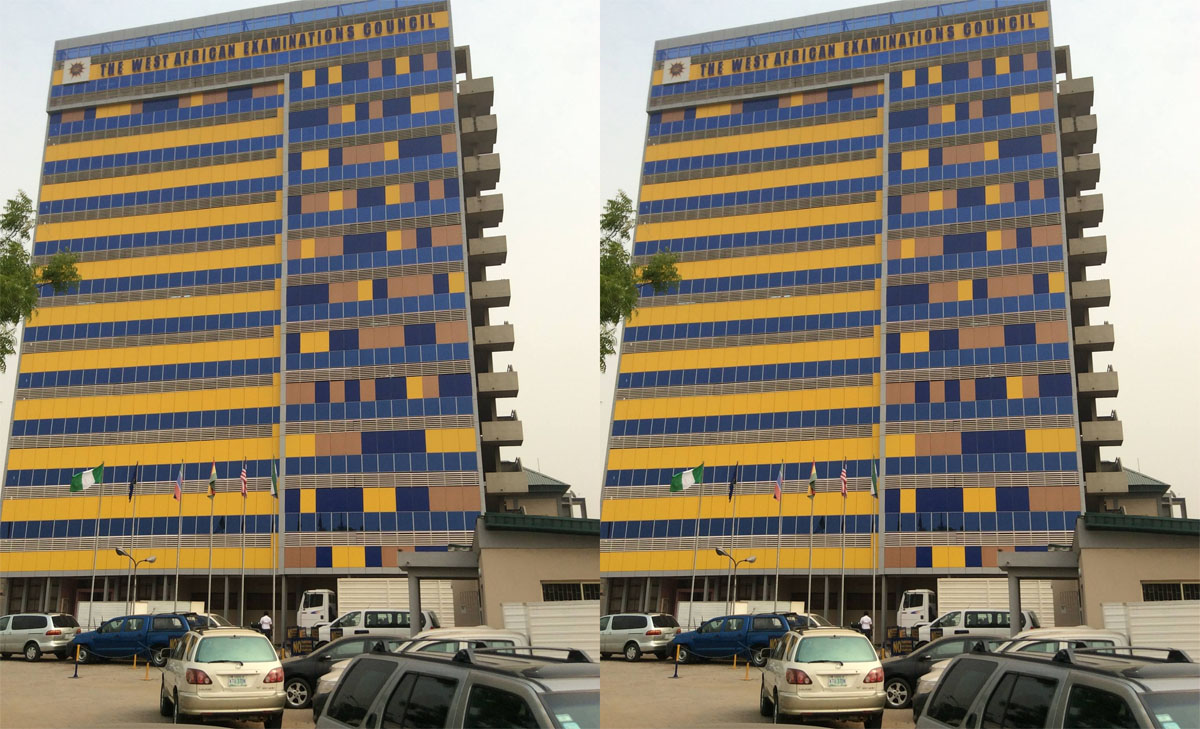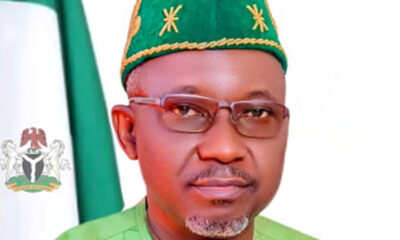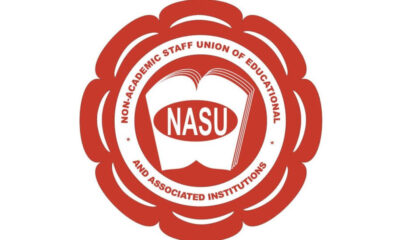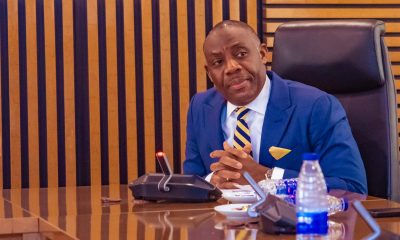Education
Striking ASUU members shouldn’t be paid – Education minister

The Minister of State for Education, Emeka Nwajiuba, has said it doesn’t make sense for members of the Academic Staff Union of Universities to continue to earn salaries while on strike.
The PUNCH reports that ASUU began one month warning strike on February 14, 2022 and since then has not suspended its industrial action.
Speaking to The PUNCH in a telephone interview on Sunday, Nwajiuba said, “The lecturers have continued to earn salaries while on strike; it doesn’t make sense to earn salaries when you have refused to work.
“If you refuse to even pay them, by the time they call off the strike, they will still come back to fight for the payment of the period they refused to work.
“You can air your grievances, come to the negotiation table without refusing to work. The issue of the strike has become a thing of concern. I have four children; two have graduated while the other two are still in public universities. I feel for them, I feel for other students who are at home. I feel the same way other parents feel, but can I bring money from my house and give it to ASUU?
READ ALSO:
- PSC promotes Magu to AIG ahead of retirement
- Terrorists use captives as human shield, says Buhari
- Imo: Gunmen rape Soldier before Lance Corporal fiancé, behead them, post video + photo
“The Ministry of Education isn’t the employer of the lecturers, we are a supervisory body, and there is no way we can fire or hire someone. Universities have governing councils that supervise the activities that go on, our job as in the ministry is to supervise, we can’t meddle in.
“On the issue of the Integrated Payroll and Personnel Information System, I am also paid via the IPPIS, it is owned by the government, there is no way you can tell the government to throw away its platform and pay you with another platform.”
Meanwhile, the President of the Senior Staff Association of Nigerian Universities, Mohammed Ibrahim, has accused the Federal Government of focusing on frivolous things and neglecting the education sector and the youths.
Speaking during the 2022 May Day celebration in Abuja on Sunday, Ibrahim said the universities were forced to shut down due to government insincerity, adding that the standard of education had continued to go down.
He stated, “Our universities have been forced to shut down due to the insincerity of the government to keep to its promises. The standard of education continues to go down due to the insensitivity of the government and the inability to provide a good teaching, learning and work environment through lack of basic facilities that will make them compete favourably with their peers in other parts of the world.
READ ALSO:
- FIFA slams fine on Nigeria over Abuja stadium fracas
- Police arrest nine suspected kidnappers in Ekiti State
- APC Presidential Ticket: Senators Divided Over Moves To Pick Lawan As Consensus Candidate
“The morale of university workers is dampened by the poor pay package and the government appears to be paying lip service to education. It is very clear that government pays more attention to frivolous things and has neglected youths that are said to be the leaders of tomorrow.’’
The SSANU President lamented the condition of Nigerian workers whom he said were going through perilous times in form of insecurity, economic hardship and other challenges.
He noted, “This year’s Workers Day comes when Nigerian workers are passing through perilous and dangerous times. Nigerian workers and indeed members of our great union are confronted with diverse challenges like rising spate of armed banditry, kidnappings, insurgency, economic hardship and worst of all, the inability of the government to keep to agreements it entered into with all the university-based unions in 2009.
“Our members have been denied payment of new Minimum Wage Consequential Adjustment arrears and backlog of earned allowances in addition to other violations of our rights and privileges. Our universities have been forced to shut down due to the insincerity of the government to keep to its promises.”
He admonished the government to resolve the ongoing strike by university workers and also tackle the challenges facing the country.
“Toying with the future of our children will spell doom for our dear country. I call on the government to look into the demands of all the university-based unions and take urgent steps to address them so that our children will go back to school,’’ the union urged.
Education
FG says colleges of education will begin awarding degrees in September

FG says colleges of education will begin awarding degrees in September
Minister of Education, Tunji Alausa, says a dual mandate allowing colleges of education (COEs) to award both bachelor’s degrees and the National Certificate in Education (NCE) is for implementation this September.
In 2023, the mandate was signed into law, having undergone ideation with numerous committees recommending its adoption.
It was to take effect from the 2024/2025 academic session (starting September 2024), where only federal COEs aged at least 10 years were to pilot the programme.
Alausa spoke in Abuja during a follow-up meeting on resolutions from the last biannual stakeholders meeting.
He said the implementation of the dual mandate will now begin in September 2025.
The education minister said it would boost enrolment in COEs and eliminate the need to convert COEs to universities.
Alausa said reforms within COEs are important for adapting to modern demands and technological advancements.
He urged educators to integrate technology, critical thinking, and computational skills into their curricula.
“We once had a strong educational system, and that’s what we are working hard to restore. All hands are on deck to achieve this,” he said.
“We must tackle the high number of out-of-school children and reduce learning poverty across the country. As teachers, you are at the centre of driving this change, and you must also challenge yourselves.
“The way we taught 30 or 50 years ago is no longer relevant. Education and teaching methods are evolving. You must start thinking about how to use technology in the classroom.”
Alausa stressed the need for educators to harness educational technology and artificial intelligence to improve teaching and learning outcomes.
Addressing declining enrolment in colleges of education, he urged administrators and staff to support the ongoing reforms, warning that the survival of their institutions depends on their ability to adapt.
“With this dual mandate, there is no need for conversion to university status. You should be the ones pushing for implementation, not the other way around. It’s a matter of your survival,” he said.
“The government has secured the future of colleges of education. It is now up to you to sustain them. Failure to embrace this mandate could lead to extinction.
“With this reform, there’s no justification for any college of education to seek university status.”
Education
Kano governor gives secondary students 10,000 free JAMB forms

Kano governor gives secondary students 10,000 free JAMB forms
The Governor of Kano State, Alhaji Abba Kabir Yusuf, has inaugurated the distribution of 10,000 free JAMB forms to Kano secondary school students.
During the flag-off of the distribution, the Governor, who was represented by the state’s Commissioner of Education, Ali Haruna Makoda, also used the opportunity to inaugurate the training of the 10,000 beneficiaries on the use of computer-based tests at various designated centers across Kano State.
On his part, the Governor’s Special Adviser on Education, Alhaji Tajuddin Gambo, said the Governor has promised to provide transport for the beneficiaries throughout the training session and urged them to ensure they pass the examination.
He said the government is willing to select the best schools for the beneficiaries if they pass the examinations.
One of the beneficiaries of the 10,000 free JAMB forms, Fatima Mukhtar Umar, expressed gratitude to Governor Abba Kabir Yusuf for issuing the free JAMB forms and promised not to disappoint.
READ ALSO:
- N10m raised to relocate boy who faced Peter Obi convoy — Lawyer
- Delta Governor’s aide, Shimite, dies on Easter Monday
- 4 killed, 8 injured in Gombe Easter Monday road accident
In a statement by Governor Abba Kabir Yusuf’s Special Adviser on Information, Ibrahim Adam, it was noted that the Governor used the opportunity to elaborate on the feats achieved by his government in developing the education sector in the last 22 months. These include the re-introduction of foreign and domestic scholarships, re-opening of 21 skills acquisition institutes, general renovation of primary and secondary schools, construction of new classrooms, provision of classroom furniture and writing materials, and the distribution of free uniforms to primary school pupils.
Other achievements, according to the Governor’s Special Adviser on Information, Ibrahim Adam, include the reduction of 50% of registration fees in state-owned tertiary institutions, cash conditional transfers to support girl-child education, and the settlement of registration fees for NECO, NABTEB, and NBAIS, to mention but a few.
Ibrahim Adam said Governor Abba Kabir Yusuf urged all the beneficiary students to make the best use of the opportunity and strive for excellence in their academic pursuits, saying that the future belongs to those who work tirelessly to turn dreams into realities.
Kano governor gives secondary students 10,000 free JAMB forms
Education
WAEC unveils portal for past WASSCE questions

WAEC unveils portal for past WASSCE questions
The West African Examinations Council, WAEC, has announced four significant innovations for the upcoming 2025 West African Senior School Certificate Examination, WASSCE. One of such is a portal to access past questions.
The notable change introduces a unique question set for each candidate, alongside a transition to a computer-based examination format.
Dr. Amos Dangut, the Nigeria National Office Head of WAEC, expressed enthusiasm about these innovations, stating, “In our continuous effort to enhance the educational experience and improve student outcomes, WAEC is excited to announce the introduction of an innovative e-learning portal and an e-study portal, along with the availability of past examination questions.”
One of the key innovations includes the addition of past questions, which will now be accessible online.
This resource is designed to help candidates prepare effectively by familiarizing them with the exam format and question styles.
“By practicing with these questions, candidates can identify their strengths and areas that require improvement, leading to better performance in the examination,” Dr. Dangut explained.
The E-Learning Portal is another significant development. This platform will offer a comprehensive suite of educational materials, including video tutorials and interactive lessons tailored to the WASSCE curriculum. “By leveraging technology, we aim to create an engaging learning environment that encourages self-paced study, ultimately enhancing the academic readiness of our candidates,” he added.
READ ALSO:
- CBEX: SEC can’t recover lost N1.3trn funds for victims, says DG
- [Updated] 9 rescued as three-storey building collapses in Lagos
- Multiple casualties as truck rams into vehicles on Abuja’s Karu Bridge
Additionally, the newly introduced E-Study Portal will serve as a centralized hub for essential study resources, including study guides and revision tips. It will also facilitate collaboration among students through discussion forums.
“This will allow them to engage with peers and educators for a more enriched learning experience,” Dr. Dangut noted.
-

 metro2 days ago
metro2 days agoRivers: Tinubu meets with Fubara, may lift his suspension
-

 metro3 days ago
metro3 days agoBring your children to compete with mine, MC Oluomo challenges those mocking his spoken English
-

 metro2 days ago
metro2 days agoI’m not in supremacy battle with Ooni, says new Alaafin
-

 Business3 days ago
Business3 days agoMarketers count losses as NNPC slashes petrol price
-

 metro3 days ago
metro3 days agoRivers: Fubara’s supporters praise Tinubu’s intervention with emergency rule
-

 metro2 days ago
metro2 days agoBandits attack Kwara North, kill vigilante, six others
-

 Business2 days ago
Business2 days agoNigeria’s gas production increases by 15.6% to 227,931.65 mscf
-

 Entertainment18 hours ago
Entertainment18 hours agoP-Square: Jude Okoye freed after two months detention











